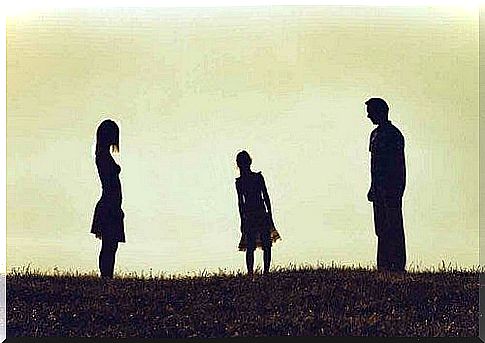Using Children To Manipulate Spouse: Why?

Often marital conflicts end up involving children, even if the latter have nothing to do with the problems of adults. In these cases, it is common to use children to manipulate the spouse. Let us first state that it is a form of violence.
Sometimes the resentment between two parents is stronger than the love and responsibility towards their children. That is why, despite the severity of the damage inflicted, they tend to use their children to manipulate their spouse.
They usually try to make them their allies to hurt the other parent. Parents must understand that this attitude is a form of violence against the child.
Using children to manipulate a spouse has negative consequences on the psychological development of the child. In some cases, these kids will find themselves having to face the consequences of this situation for life.

Using children to manipulate spouse
There are many ways in which children are exploited to manipulate the spouse (sometimes not obvious, sometimes explicit).
Dr Ana Cristina de la Cruz, psychologist and lecturer at the National University of Cordoba (Argentina), along with many other authors, defined these parents as “alienating parents”.
On the basis of several studies, he stated that there is a certain variety of behaviors typical of this type of parenting. The most common are the following:
- Refuse to provide information on children.
- To belittle and insult the other parent in front of the children.
- Making decisions about children without consulting the other parent.
- Involve the school in problems.
- Prevent children from talking to or seeing the other parent.
- Involve other relatives or friends in your other parent’s “discrimination campaign”.
And then…
- Threatening children with punishment or similar if they behaved well with the other parent.
- Downplaying contributions or gifts made by the other parent.
- Use children to send messages to the other parent.
- Playing the victim in front of the child to turn him against the other parent.
In principle, it is a question of limiting the chances that the child can build a healthy relationship with the other parent, as well as achieving personal goals by making use of the effects that the children have on the spouse or ex-spouse.
Using children: the motivations of manipulative parents
It is obvious that the intention to manipulate the spouse, especially using children, does not arise in the context of a healthy relationship. Usually this behavior is adopted when following a breakup or divorce, but you can also do so to achieve the opposite: maintain a deteriorated relationship.
In the first case, usually the manipulative parent feels a deep resentment towards the ex partner, perhaps because it was he or she who ended the relationship; or because he thinks he is at an economic disadvantage and believes that the agreements made are not fair. Additionally, jealousies may have arisen because the other person has a new partner.
In the second case, it is very often thought that using children to manipulate the spouse is something to be done “for a just cause”. In this case the situation becomes complicated, because the children are emotionally involved in the goal of preventing the relationship between the parents from ending.

The consequences for the children
The report – already mentioned – by Dr. Ana Cristina de la Cruz indicates that when one of the parents tries to distance their children from the other parent, feelings of anguish, uprooting, loneliness and frustration appear. In the most serious cases, then, there is a tendency to depression, suicidal ideas, anger, a feeling of helplessness, disorientation and chronic health disorders.
When the children are not physically separated from the other parent, but play a role in the relationship crisis experienced by the parents, the feelings are not so different. However, in this case a strong sense of guilt can manifest, as they are entrusted with the task of preventing the relationship between the parents from ending.
Very often, therefore, they come to hate the other parent as a mechanism to get out of the labyrinth in which they find themselves. This often leads them to have difficulty identifying and expressing feelings. At the same time, they tend to project this instability on future couple relationships.









